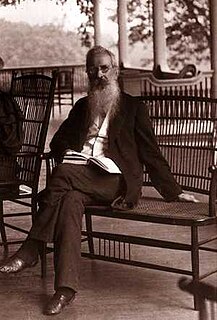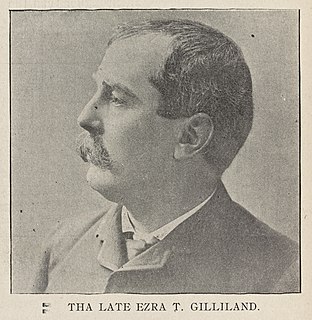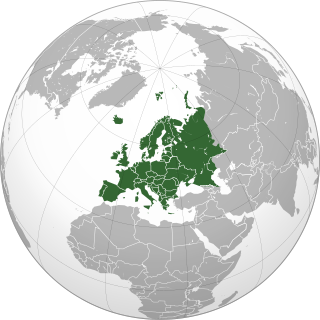
A telephone, or phone, is a telecommunications device that permits two or more users to conduct a conversation when they are too far apart to be heard directly. A telephone converts sound, typically and most efficiently the human voice, into electronic signals that are transmitted via cables and other communication channels to another telephone which reproduces the sound to the receiving user.
The Oriental Telephone Company was established on January 25, 1881, as the result of an agreement between Thomas Edison, Alexander Graham Bell, the Oriental Bell Telephone Company of New York and the Anglo-Indian Telephone Company, Ltd. The company was licensed to sell telephones in Greece, Turkey, South Africa, India, Japan, China, and other Asian countries."

Tivadar Puskás de Ditró was a Hungarian inventor, telephone pioneer, and inventor of the telephone exchange. He was also the founder of Telefon Hírmondó.
This timeline of the telephone covers landline, radio, and cellular telephony technologies and provides many important dates in the history of the telephone.

The Reis telephone was an invention named after Philipp Reis of a telephonelike device he constructed. Reis's first successful work is dated to October 1861.

The invention of the telephone was the culmination of work done by many individuals, and led to an array of lawsuits relating to the patent claims of several individuals and numerous companies. The first telephone was invented by Antonio Meucci, but Alexander Graham Bell is credited with the development of the first practical telephone.
Northwestern Bell Telephone Company served the states of the upper Midwest opposite the Southwestern Bell area, including Iowa, Minnesota, South Dakota, North Dakota, and Nebraska.

Gardiner Greene Hubbard was an American lawyer, financier, and community leader.
Chichester Alexander Bell (1848–1924) was a chemist, first cousin of Alexander Graham Bell, and instrumental in developing improved versions of the phonograph.

17 & 19 Newhall Street is a red brick and architectural terracotta Grade I listed building, situated on the corner of Newhall Street and Edmund Street in the city centre of Birmingham, England. Although its official name is 17 & 19 Newhall Street, it is popularly known as The Exchange, and was previously known as the Bell Edison Telephone Building.
Hello is a salutation or greeting in the English language. It is first attested in writing from 1826.

This history of the telephone chronicles the development of the electrical telephone, and includes a brief review of its predecessors.
Acoustic telegraphy was a name for various methods of multiplexing telegraph messages simultaneously over a single telegraph wire by using different audio frequencies or channels for each message. A telegrapher used a conventional Morse key to tap out the message in Morse code. The key pulses were transmitted as pulses of a specific audio frequency. At the receiving end a device tuned to the same frequency resonated to the pulses but not to others on the same wire.

Alexander Graham Bell honors and tributes include honours bestowed upon him and awards named for him.

The Volta Laboratory and the Volta Bureau were created in Georgetown, Washington, D.C. by Alexander Graham Bell.
The Telephone Cases, 126 U.S. 1 (1888), were a series of U.S. court cases in the 1870s and 1880s related to the invention of the telephone, which culminated in the 1888 decision of the United States Supreme Court upholding the priority of the patents belonging to Alexander Graham Bell. Those telephone patents were relied on by the American Bell Telephone Company and the Bell System—although they had also acquired critical microphone patents from Emile Berliner.
Edison Bell was an English company that was the first distributor and an early manufacturer of gramophones and gramophone records. The company survived through several incarnations, becoming a top producer of budget records in England through the early 1930s until, after it was absorbed by Decca in 1932, production of various Edison Bell labels ceased.

Ezra Torrance Gilliland was an inventor who designed the telephone switchboard and the magneto bell. Gilliland had a laboratory in his home and "kept seven expert electricians employed" as he worked on his ideas. He built the first telephone exchange in Indianapolis in the 1870s under the name Gilliland Telephone Manufacturing Company and later worked for the Bell Telephone Company.












